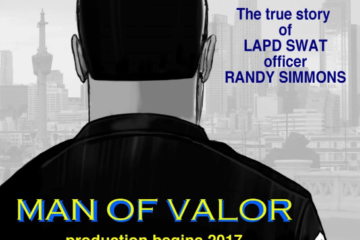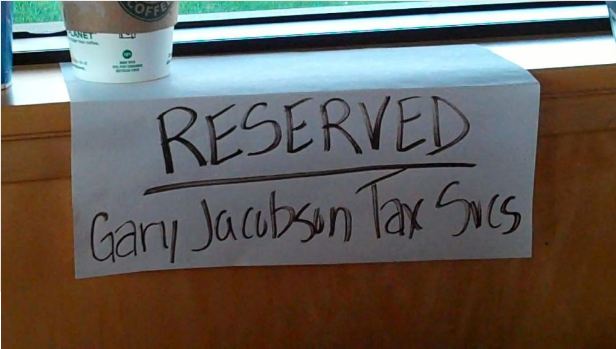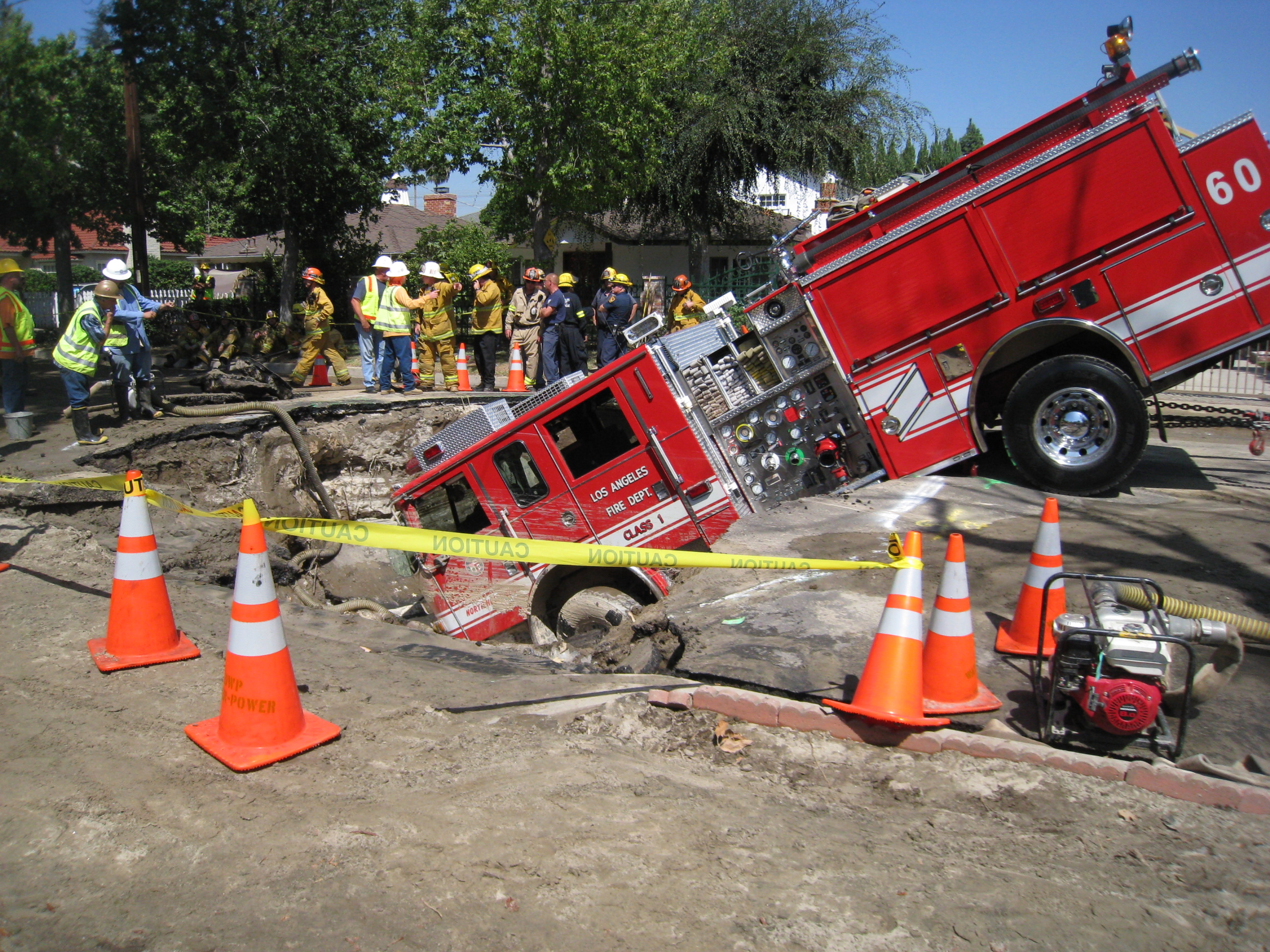Patricia Nazario won a Golden Mike Award for reporting on organizers expecting thousands of marchers in Los Angeles and other cities. The demonstrations signal the next phase of activism that seeks major changes in American immigration policy. In the months since illegal immigrants and their supporters participated in mass rallies, Patricia Nazario explores how a backlash, against their demands, has been gaining momentum.
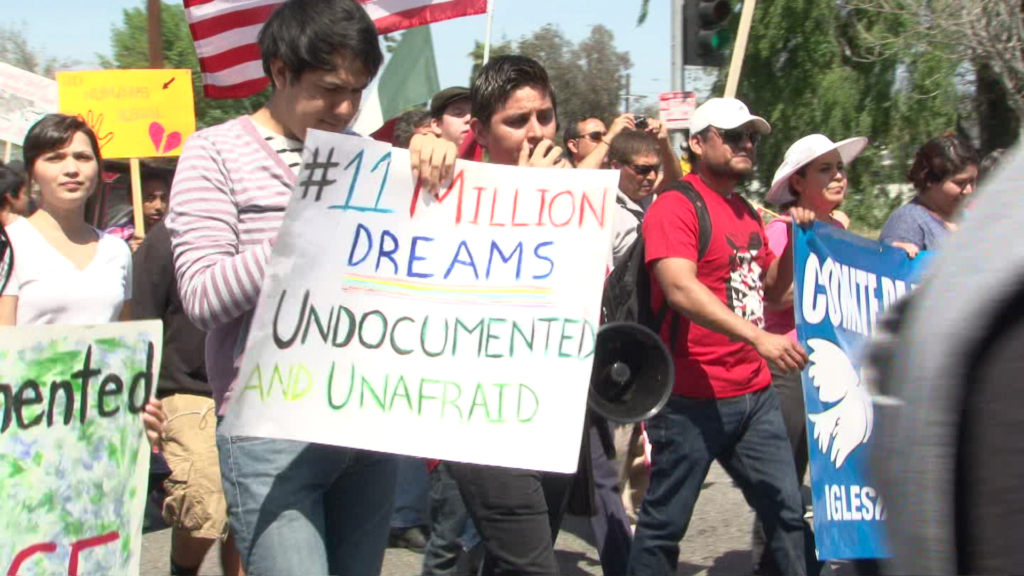
Undocumented students seeking a path to citizenship. (Photo by Patricia Nazario)
At a recent rally in Maywood, about 250 people, mainly Hispanics, push back. They gather on one side of Maywood City Hall. Police barricades and about three-dozen officers in riot gear separate them from the other side – and from about 40 protesters from the anti-illegal immigration group, Save Our State. Its founder, Joseph Turner, says he’s trying to stop the wave of newcomers from Mexico and Latin America. That’s why he’s brought the protest here, to a city that considered but never formally endorsed non-cooperation with U-S immigration laws.
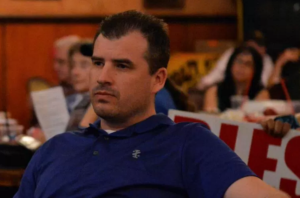
Joseph Turner listens to Tea Party members speak on stage as he waits to guest speak at the Redlands Tea Party gathering at Mill Creek Cattle Company in Mentone, Calif. on Thursday, April 6, 2017. Turner began recruiting for volunteers to his petition drive to ban undocumented immigrants from school in the Yucaipa-Calimesa JUSD. Photo: The Press Enterprise
“Maywood is a city that’s acted with impunity,” says Turner. “They’ve openly declared themselves a sanctuary city to illegal aliens… we’re here to punish them for that transgression.”
Turner is 29-years-old. He’s a graduate of USC. On this day, he’s wearing a Trojan t-shirt. California has changed in his short lifetime.
It’s one reason he’s organized rallies like this.
“We have massive influxes of people who are here illegally and then they also have children, or offspring, who then become citizens,” says Turner. “So you see a swelling of the Hispanic demographic in the state.”
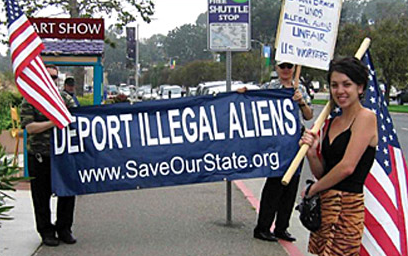
Joe Turner started the group SaveOurState.org, which takes a strong anti-immigration at rallies. Southern Poverty Law Center (SPLC)
To many people, that swelling translates into strains on society: more crime, inferior public schools, and crowded hospital emergency rooms. That perception isn’t exclusive to conservative Whites.
“There is a significant section of black folks that are… racists,” says Ayuko Babu director of South L.A.’s annual Pan-African Film and Arts Festival, “that are fearful that are resentful and that also resent the competition.” Competition for jobs, elaborates Babu from Eso-Won Bookstore in Leimert Park; L.A.’s premiere venue for African-American authors.
Babu doesn’t agree with it, but says there’s widespread fear among Blacks in L.A. that they’re losing to the people they call Chicanos the cultural and political clout they’ve enjoyed for 40 years.
“When they say Chicano, when they say Mesican, as opposed to Mexicans, they mean all of them whether it’s an El Salvadorian, Guatemalan or Nicaraguan, Central American,” says Babu. “That whole group of Hispanic people that are coming here. They feel they’re going to replace Black folks and that we’re going to be pushed down to the bottom.”
This tension between Blacks and Latinos is playing out because few local or national leaders are addressing its causes, says State Senator Gil Cedillo. He’s a Democrat who represents the district that includes Maywood.
“This crisis, this hysteria comes out of a circumstance where the economy is not functioning to meet the needs of the people,” says Cedillo.
“So, people see what’s different and since we have a decline in the quality of life in California over the last 25-years, they look to see what’s different, to look to see the explanation…”
Something similar happened in this country before World War II. Americans who believed people from Southern and Eastern Europe… and Latin America were inferior urged an end to all immigration. Today, the public debate focuses on illegal immigrants. Rallies often erupt into rhetorical battlegrounds where tempers run high.
At the rally in Maywood, as opposing protesters clash inside a store: “You racist scum… you come here to provoke us!”
This sort of hostility isn’t just playing out in border areas like Southern California. Earlier this summer in Hazelton, Pennsylvania, city council members adopted laws that punish employers and impose fines on landlords who hire or rent to illegal immigrants. The old coal mining town also prohibits city documents and signs in any language but English.
“From a legal point of view, that’s nonsense, okay?” says UCLA Sociology Professor Ivan Light. He agrees that people who sneak across the U.S. border are on dubious legal ground in this country. He describes what happened in Hazelton as an abuse of police power endorsed by local voters.
“They give the authority to police to enforce laws which are manifestly illegal and which they have no authority to enforce,” says Light. “In the short run it does have the consequence of ridding their neighborhood of unwanted immigrants, although it does nothing to stem the flow of immigration at the border.”
That’s where frustrated Americans are stepping in. At the Maywood rally, Joseph Turner admits his anti-illegal immigration group attracts some supporters with extreme views. But he says that’s not its only mission. The self-proclaimed nationalist says his supporters are justifiably concerned citizens.
“I believe in the superiority of America and American culture,” says Turner. “I believe allowing massive illegal immigration into our nation undermines our sovereignty and threatens that superiority.”
Maywood Vice Mayor Felipe Aguirre says he, too, is standing up for principle. He regularly sponsors voter registration drives and advises immigrant families about the naturalization process. Anti-illegal immigrant activists, he says, would rather see him and other Latino elected officials push to enforce U-S laws already on the books.
“They don’t want people to be here illegally,” says Aguirre. “We don’t want them to be here illegally, but we want them to become legalized. They just want to deport everybody.”
That everybody numbers about two-million people in L.A. County. The Census Bureau projects that soon Hispanics in L.A. will outnumber Whites by nearly two-to-one, and Blacks by about five-to-one. The strong reaction of some Whites and Blacks forms part of the backdrop for tomorrow’s marches in Los Angeles and other cities, and may determine how important the immigration issue becomes in this November’s midterm elections.
